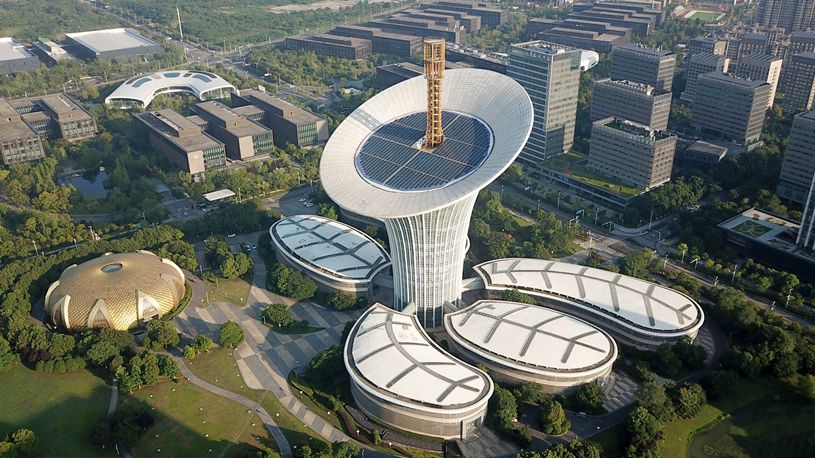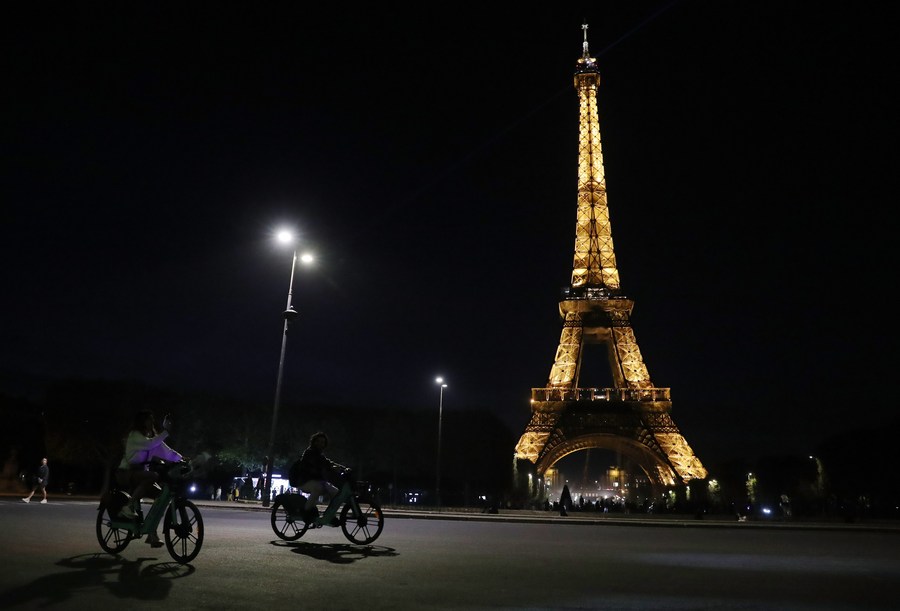
The lighting Eiffel Tower is seen in Paris, France, Sept. 22, 2022. (Xinhua/Gao Jing)
The goal of the "energy sobriety plan" of Paris is to reduce the city's consumption by 10 percent, the equivalent of the energy consumption of 226 schools, Hidalgo explained.
PARIS, Sept. 23 (Xinhua) -- The lights on the Eiffel Tower will be switched off at 11:45 p.m. from this Friday, in a bid to save electricity due to the energy crisis.
Other major monuments in the French capital, such as the Paris City Hall, the Saint-Jacques Tower and the city's museums will no longer be lit from 10 p.m..
"The City of Light will remain the City of Light," emphasized mayor of Paris Anne Hidalgo, during a presentation of the "energy sobriety plan" of Paris on Sept. 13.
"It is important to show that everywhere, including this monument...which we symbolically light up in green when there are important moments for the climate, will also participate."
An earlier switch-off time for the lights on the "Iron Lady", built by engineer Gustave Eiffel 133 years ago, will lead to energy savings of four percent, Hidalgo added.
According to the Eiffel Tower's operating company, the annual night-time energy consumption of the "Iron Lady" amounts to 6.7 gigawatt hours, or about the equivalent of the energy consumption of a town of 3,000 people. The monument attracts six million visitors per year.
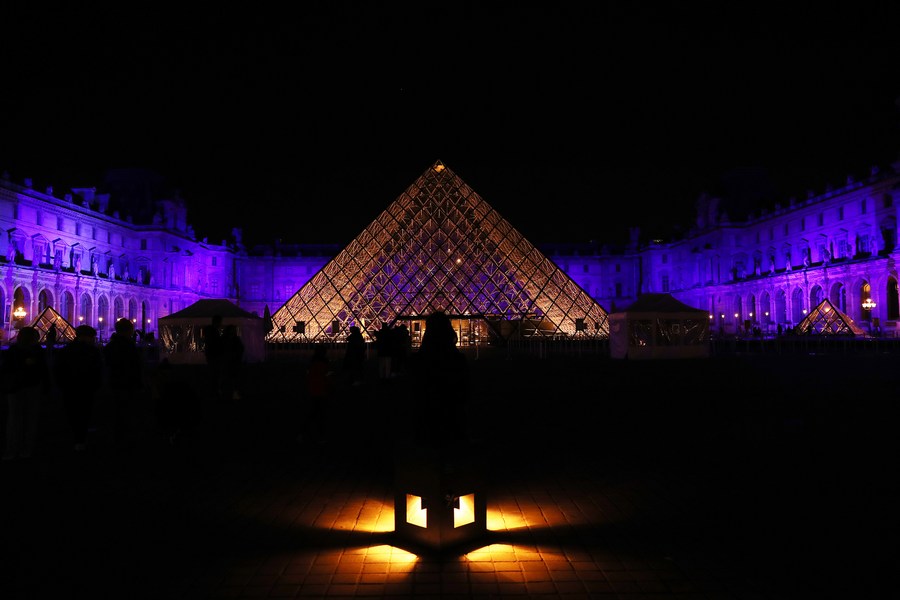
The Louvre Museum is lit up in blue to celebrate the start of the French presidency of the European Union in Paris, France, Jan. 1, 2022. (Xinhua/Gao Jing)
Meanwhile, the ornamental lighting on the facades and monuments of the capital will be switched off at 10 p.m. from this Friday. This includes the City Hall, which is usually illuminated until 1 a.m., the Saint-Jacques Tower, the city's museums, and the city halls for Paris' boroughs (arrondissements). According to the city of Paris, this will save nearly 10 million euros (9.7 million U.S. dollars).
The goal of the "energy sobriety plan" of Paris is to reduce the city's consumption by 10 percent, the equivalent of the energy consumption of 226 schools, Hidalgo explained.
She also called on the state to take similar action for national monuments, and for the owners of private monuments to take steps in the same direction.
France's Minister of Culture Rima Abdul Malak announced on Sept. 17 that the Louvre pyramid and the facade of the Palace of Versailles would be switched off earlier to save energy.
However, she said that although symbolic measures were important to raise awareness, they are not enough.
Other major French cities are also committed to energy sobriety. In Marseille (Provence-Alpes-Cote d'Azur region), emblematic buildings such as the Pharo, the Major, the Longchamp Palace and the Opera will be switched off earlier from the end of the month.
The city of Lille (Hauts-de-France) has already implemented such measures. According to a statement from the city hall, they represent annual savings of around 170,000 kWh of energy consumption.
In Strasbourg (Grand Est), where the famous Christmas market attracts over two million visitors each year, the city hall faces the challenge of ensuring energy sobriety while preserving the spirit of the event.
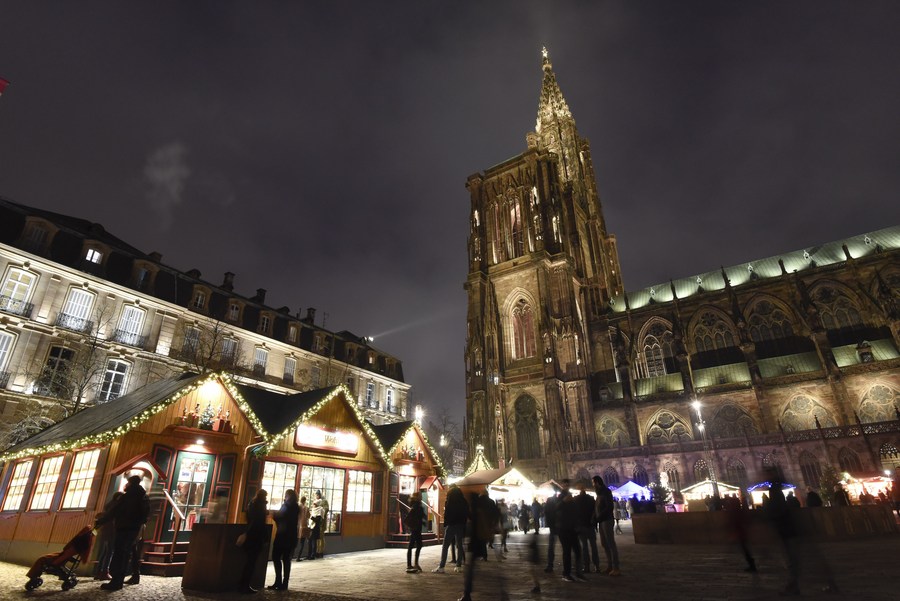
Photo taken on Nov. 23, 2018 shows the Christmas market in Strasbourg, France. (Xinhua/Genevieve Engel)
"We are working on the whole project, so that it is coherent. We are thinking about illuminations but also about the 300 chalets which consume a lot of energy," deputy mayor of Strasbourg Guillaume Lisbsig told the regional press.
Due to a decree on March 31, 2022, heating the outdoors of bars and restaurants and all outdoor public spaces will no longer be allowed at the Strasbourg Christmas market this year, or anywhere else in France. Shopkeepers are stepping up against this decision.
In Paris, the famous Christmas illuminations on the Champs-Elysees will also be significantly reduced. The committee which organizes the festivities on "the most beautiful avenue in the world" said that it wanted to "significantly" reduce the Christmas illuminations and the lighting of windows.
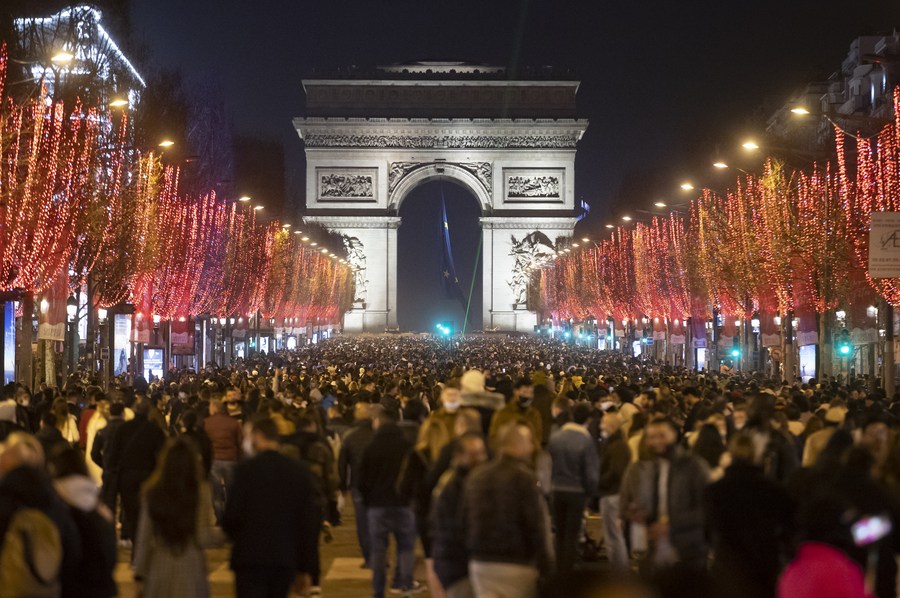
People gather at the Champs Elysees Avenue to celebrate the New Year in Paris, France, Dec. 31, 2021. (Xinhua)
"The Champs-Elysees ought to participate collectively and in solidarity with the efforts asked of the French," the committee said.
However, it added: "This must not compromise the cultural, tourist, commercial, economic outreach of the Champs-Elysees or the aesthetic and playful quality of walks on the avenue during festive periods."
France, like many other European countries, is facing an energy crisis this winter. French Prime Minister Elisabeth Borne has already announced that rolling blackouts are possible. (1 euro = 0.97 U.S. dollar)■







